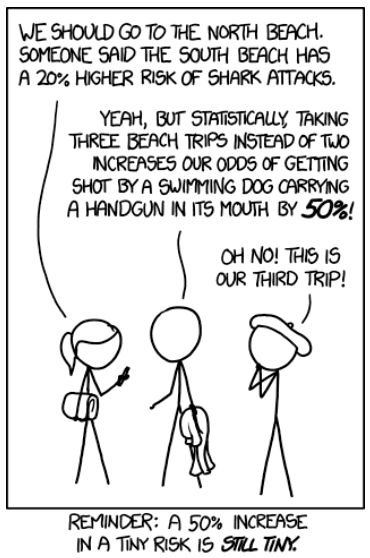Medical Risk
If you’re like most people, when you hear on the local news report that drinking faloopi juice triples your chances of contracting Schmeckheimer’s liver disease, it sounds like a death sentence. Why would anybody in her right mind continue to drink the stuff?
Hold it a second. You’re missing a critical piece of information, without which you cannot make an informed decision.
You need to know what your chances are of contracting Schmeckheimer’s if you don’t drink the faloopi juice.
Let’s say it’s one out of a million.
In other words, essentially, you ain’t gonna get Schmeckheimer’s.
But now you start quaffing faloopi juice, and all of a sudden, your chances of getting it triple.
Oh no!
There’s a great old story about George Washington, who told his groundskeeper to plant a row of cypresses along the drive the next morning. The groundskeeper replied, "But sir, those trees will take a hundred years to grow!"
Washington thought about it for a second, then answered, "Well, then: I rather suppose you’d better do it this afternoon."
He didn’t understand the meaning of the data.
Think about the numbers for a second. Are you really scared by odds of three out of a million? If you are, you’d best never step foot outside of your door again, because your odds of being killed by a gunshot are a heck of a lot higher than that. For that matter, maybe you better get out of the house, because the chances of your falling in the bathroom and cracking your skull open are even higher. Just don’t get in your car, because…
You get the picture.
Now about that diet drug example I mentioned in the Introduction. If you recall, you’re overweight but not taking a new diet drug because you’re afraid of contracting pulmonary hypertension, a potentially fatal disease. You read, and you believe, that the drug increases your likelihood of getting the disease by a factor of eight times.
Here are two things you may not know:
First, your chances of getting the disease if you don’t take the drug are pretty slim: about one out of 400,000.
So eight times that probability is one out of fifty thousand. Stated another way, out of the two million people currently taking the drug, 40 of them are likely to contract pulmonary hyptertension sometime in the next few years.
Sound bad? Get this: 400 of them are likely to die in auto accidents in the next twelve months.
Because dying in an auto accident within the next year is ten times more likely than getting pulmonary hypertension sometime in the next several years if you use a new diet drug.
One out of 50,000 is not something you should worry about.
Here’s the second piece of information you might not be aware of: Being very overweight (more than 20% above your ideal weight) makes you 200 times more likely to die prematurely than someone who isn’t overweight.
Now let’s do some simple math and state things in a more useful comparative format.
1) If you take the drug, you’ve got a 1 out of 50,000 chance of dying prematurely from pulmonary hypertension.
2) If you don’t take the drug, you’ve got a 1 out of 5,000 chance of dying prematurely from an obesity-related disease.
Therefore, taking the drug makes you 10 times more likely to live to a ripe old age.
Now I don’t want to con you either. There are an awful lot of very smart medical researchers out there who don’t buy this argument, primarily because a) it doesn’t take into account certain other factors that may come into play, and b) they don’t believe the data behind some of the numbers.
So I’m not suggesting that you take Phen-Fen and not worry about a thing.
What I am suggesting is that you don’t get scared away from doing something that is potentially beneficial, or that you simply enjoy, because of a scary sounding statistic taken out of context. Life is usually about trade-offs, not absolutes, and you need all the information to come to a conclusion that works for you.
Go ahead and swig the faloopi juice. And always dig beneath the numbers.

